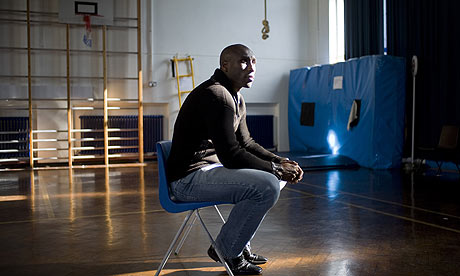
Sol Campbell thought long and deeply before taking the plunge across north London's football divide. The defender knew that the Bosman transfer to Arsenal in 2001 would ensure he became a hate figure at Tottenham, the club where he had emerged from the youth sides, yet even in his most vivid nightmares he cannot have imagined the full horror of the reality.
The Portsmouth captain reflected upon it, not for the first time, towards the onset of last winter. The images that flashed in front of him might have featured his mother, Wilhelmina, who must also deal with the bile that teems down from the Tottenham terraces, or perhaps his brother John, one of 12 siblings, who was jailed in 2005 for 12 months for assaulting a man who questioned Campbell's sexuality. Maybe, there was one of Campbell's young son, Joseph, who is still to be exposed to the hatred.
Campbell was sitting inside a police station in Hampshire. On 28 September he had heard the sickening taunts from what the superintendent Neil Sherrington would describe as a "significant number" of the 2,500 Tottenham fans who travelled to Fratton Park for their team's 2-0 Premier League defeat. For Campbell the time for action had come.
The police, having acted upon the complaint brought before them, searched for legal precedent. They found none. The decision to bring charges against 11 supporters for "indecent chanting" represented a bold step that Campbell hopes can be followed by the football authorities. He would like to see them deduct points from clubs whose fans are found guilty of indecent and racist chanting.
One of the many talking points from the events of last September concerns the suggestion of racism. Tottenham and their supporters have argued passionately that the chant in question contained no such undertones, which the police accepted with the wording of their charges. It is disingenuous to say the least that the accompanying accusation of homophobia has been greeted with little more than shrugs. Campbell, though, clearly feels that there is a racist element to the chant and he expressed his anger when he was asked how it made him feel.
"You get on with the game," he said, "but it's quite embarrassing because when you see that some of the teams have got black players themselves ... it's unbelievable, it's strange. I think, 'What do the black players on the other side think?' You know, 'You're OK but we can shout about them.' It's embarrassing. It's a shame."
Campbell says that the charges brought "woke up a lot of people" but for too long he has had his eyes wide open to the vitriol, which starts at a distressingly young age. "They learn from their mother or father and, if that keeps on happening, in the end they just think it's acceptable and the norm," said Campbell.
"It's quite shocking, really. If you carry on like that in the streets, you're either going to get arrested or you're going to start a fight and you might come off worse."
"My mum copes with it all," he continued. "Obviously, she's aware of it but she's strong. She reared 12 kids so she's a very hardy woman. Any mother would get upset but that's only human."
Campbell has a lot on his mind at present and the future at Portsmouth, where Chelsea visit tonight, vies for prominence. From the joy of lifting the FA Cup last May, he finds himself in unsettling limbo. Not only is the club up for sale, the team in relegation trouble and the manager, Paul Hart, a caretaker, but Campbell is among the alarmingly high number of players out of contract in the summer.
"Portsmouth have to look at the whole finance situation before they start coming to players," he said. "They'll probably have to sell [the club] before they start looking at other situations. All the players have to wait and see what the club's prepared to do. You can't do anything until the club is sold or [the owner] stays on or whatever. It's tough because we just needed two or three good players [last summer] and we'd have been up there. We finished eighth and we'd have been up in Aston Villa's position now, there's no question. That's the sad thing about it. We were so close.
"There is potential there at Portsmouth but I really do think they've, for whatever reason ... it's gone now. In the sense that to get back to the level of European football on a regular basis, it's going to take a big effort now over the seasons. We were cruising until we lost all of those players; Pedro [Mendes] and Sulley [Muntari] last summer, [Jermain] Defoe and [Lassana] Diarra in January. If any side lose four good players and don't replace them, you're not going to be firing on all cylinders. It's not rocket science."
When Harry Redknapp quit as the Pompey manager to join Tottenham in late October, the team had won four and drawn one of eight Premier League games. His successor, Tony Adams, oversaw a ruinous run of two wins and five draws from 16. "You have to keep believing but it just kept on going the other way," said Campbell. "When you are eighth and then you are one point off the bottom, it's hard to take. Eighth and then nothing works, nothing. It's unbelievable.
"How long can you go on for? But I think it got sorted before it got really messy. Paul Hart's fantastic, he's straight down the line and [the coach] Brian Kidd has come in, he's really upbeat, he knows his stuff and the lads have responded very well. Everyone is thinking and working in the right direction, especially the training now, it's good. We just have to keep going."
Campbell is determined to look forward with optimism, both on and off the pitch.

